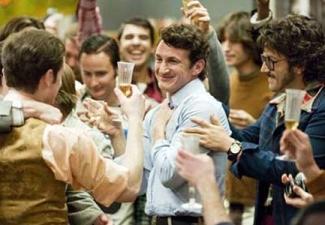- MENU
- HOME
- SEARCH
- WORLD
- MAIN
- AFRICA
- ASIA
- BALKANS
- EUROPE
- LATIN AMERICA
- MIDDLE EAST
- United Kingdom
- United States
- Argentina
- Australia
- Austria
- Benelux
- Brazil
- Canada
- China
- France
- Germany
- Greece
- Hungary
- India
- Indonesia
- Ireland
- Israel
- Italy
- Japan
- Korea
- Mexico
- New Zealand
- Pakistan
- Philippines
- Poland
- Russia
- South Africa
- Spain
- Taiwan
- Turkey
- USA
- BUSINESS
- WEALTH
- STOCKS
- TECH
- HEALTH
- LIFESTYLE
- ENTERTAINMENT
- SPORTS
- RSS
- iHaveNet.com

The story of Harvey Milk is a tragedy, but not since Jeff Spicoli in "Fast Times at Ridgemont High" has Sean Penn played such a serenely happy individual.
It does an actor good to play a joyous character. In "Milk," Penn is superb as the martyred San Francisco city supervisor, America's first widely acknowledged openly gay elected official. He was killed by Milk's former colleague, Dan White, minutes after White's fatal shooting of Mayor George Moscone in 1978.
The key to Penn's performance is its utter refusal to play the ending rather than the process -- personal, political, human -- that put Milk in a position of martyrdom.
Sean Penn makes each new exchange and encounter something to behold, a lesson in giddy, knowing interpersonal relations. His easy grin is infectious. "Milk" reminds us that politics is a matter of time, luck and the right force of nature.
A conventionally structured but very satisfying biography, director Gus Van Sant's film "Milk" confines its narrative to the years 1970 through 1978.
An ex-Navy and ex-Wall Street man, Harvey Milk tried San Francisco with a boyfriend in 1968, returning to New York in 1970. Two years later he again went west, this time with lover Scott Smith, played by a genial, charismatic James Franco. Photographed by Harris Savides, who cast a more sinister light on a very different San Francisco story, "Zodiac," "Milk" shrewdly keeps the melodrama out of the drama. Josh Brolin mines Dan White's rage and political impotence for all they're worth, but subtly. Like Penn, Brolin plays each scene as a slice of a man's life rather than a signpost en route to bloodshed.
We know from the start what is going to happen. Screenwriter Dustin Lance Black begins with Penn, alone in his apartment at night, tape-recording a last will and testament months before his death, acknowledging that as a newly elected member of the San Francisco board of supervisors he "could be assassinated at any moment, any time." The same words are heard, for real, in the Oscar-winning 1984 documentary "The Times of Harvey Milk."
Sean Penn clearly has studied his subject, but he makes him his own.
Emile Hirsch plays Cleve Jones, one of thousands of Castro district newcomers in the 1970s. He became Milk's friend and ally. Hirsch is first-rate. All the performances are. This is an actors' picture, and Van Sant shapes it as such, as he brings the Castro district to scruffy, "degenerate" (Milk's own playful label), teeming life.
In the past, the director's capital-R Respectable mainstream pictures -- "Good Will Hunting," "Finding Forrester" -- have avoided all the idiosyncrasies of subject and style found in Van Sant's most compelling independent work.
The movie "Milk" is far more interesting than those two, however.
There's a deftness of tone in "Milk," unshowy but rich, that recalls Van Sant's bracing "Drugstore Cowboy" nearly a generation ago. To be sure, "Milk" sticks to a familiar template. The writing is more efficient than inspired; Danny Elfman's musical score is on the heavy, stringy side; and certain aspects of Milk's personality, especially the temper alluded to in the 1984 documentary, are papered over rather than explored. But on its own terms it's deeply satisfying.
The film has an obvious topical hook in California's Proposition 8, which bans same-sex marriage.
"Milk," however, is not primarily topical, even though it reminds us all that the march of history is full of fear-based obstacles. Van Sant's only real agenda here is to pay tribute to an unlikely politician, and to remind us all that guiding lights are not to be taken for granted.
Milk Movie Trailer
"Milk"
8 Academy Award Nominations:
- Milk - Best picture
- Sean Penn - Performance by an actor in a leading role
- Josh Brolin - Performance by an actor in a supporting role
- Costume design
- Directing
- Film editing
- Original score
- Original screenplay